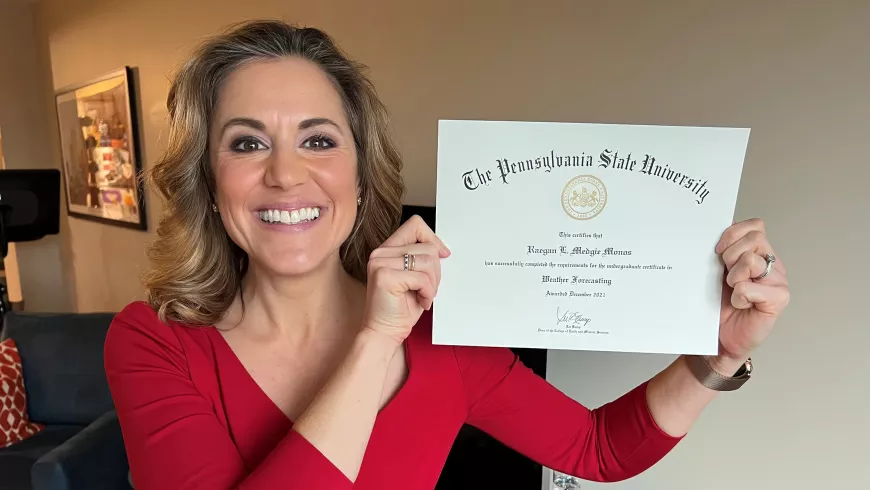100% Online
Complete your Penn State course work at your own pace and 100% online.
Application deadline
Credits and costs
Gain Skills to Analyze Weather and Climate
Produce value-added point forecasts including high/low temperature, wind speed, and precipitation.
Monitor significant global weather events and seasonal climate features.
Evaluate synoptic and mesoscale weather events of varying complexity by referencing proper terminology and processes.
Share current weather data either generally or at a specific location via verbal or written communication.
Online Courses Provide a Foundational Apprenticeship in Weather Forecasting
Online Courses Provide a Foundational Apprenticeship in Weather Forecasting
This online program uses cutting-edge forecasting techniques and innovative conceptual models to help you learn more about the science of meteorology. Interactive, web-based animations can help you develop operational forecasting skills and gain keen insights into how the atmosphere works.
As a student in this program, you will have an opportunity to become a better-informed, critical consumer of weather-related news. Whether you are an amateur weather enthusiast or a weather-related industry professional, you can refine your skills to predict the weather more effectively.
Upon completion of this certificate program, you may be able to apply the 12 credits earned toward a bachelor's degree at Penn State or another accredited institution.
To earn this certificate, you must successfully complete the four prescribed meteorology courses.
- METEO 101 is offered spring, summer, fall
- METEO 241 is offered fall and summer
- METEO 361 is offered spring and summer
- METEO 410 is offered fall and spring
Required Courses (12 credits)
Prerequisites as listed may be waived by the course instructor if you can demonstrate the required level of competency. Students need to earn at least a "C" grade in all four courses to be eligible for the certificate.
- 3credits
Fundamental principles of synoptic and physical meteorology, satellite and radar imagery, and data analysis in the setting of mid-latitude weather forecasting.
- 3credits
Applying atmospheric principles to the tropics, with an emphasis on the development, structure, prediction, and destructive impact of hurricanes.
- Prerequisite
METEO 101
- 3credits
Applying atmospheric principles to small-scale weather systems, with an emphasis on the conceptual modeling and short-range prediction of severe thunderstorms.
- Prerequisite
METEO 101
- 3credits
Exploring highly specialized topics and techniques in weather forecasting that span from mesoscale to planetary spatial scales and short-term to long-range time scales.
- Prerequisite
METEO 101, METEO 241, METEO 361
Course Availability
If you're ready to see when your courses will be offered, visit our public LionPATH course search (opens in new window) to start planning ahead.
Start or Advance Your Career

Start or Advance Your Career
You can use the knowledge gained from this program and the support of Penn State career resources to pursue careers in a variety of fields, depending on your goals.
Career Services to Set You Up for Success

From the day you're accepted as a student, you can access resources and tools provided by Penn State World Campus Career Services to further your career. These resources are beneficial whether you're searching for a job or advancing in an established career.
- Opportunities to connect with employers
- Career counselor/coach support
- Occupation and salary information
- Internships
- Graduate school resources
Upcoming Events
Ready to Learn More?
Get the resources you need to make informed decisions about your education. Request information on this program and other programs of interest by completing this form.
Ready to take the next step toward your Penn State undergraduate certificate?
Costs and Financial Aid
Costs and Financial Aid
Learn about this program's tuition, fees, scholarship opportunities, grants, payment options, and military benefits.
Costs and Financial Aid
Undergraduate Tuition
Undergraduate tuition is calculated based on the number of credits for which you register and the number of total credits you have accrued at or transferred to Penn State.
Tuition is due shortly after each semester begins and rates are assessed every semester of enrollment.
2024–25 Academic Year Rates
| How many credits do you plan to take per semester? | If you have 59 or fewer credits | If you have 60 or more credits |
|---|---|---|
| 11 or fewer | $632 per credit | $678 per credit |
| 12–19 | $7,678 per semester | $8,288 per semester |
2025–26 Academic Year Rates
| How many credits do you plan to take per semester? | If you have 59 or fewer credits | If you have 60 or more credits |
|---|---|---|
| 11 or fewer | $638 per credit | $685 per credit |
| 12–19 | $7,755 per semester | $8,371 per semester |
Undergraduate students taking more than 19 credits will be charged the flat tuition rate plus the regular per credit hour rate for each credit above 19.
Paying for Your Certificate
Students pursuing a certificate are considered "nondegree," a status that is not eligible for federal student aid, including the Federal Direct Stafford Loan program. A private alternative loan may be an option to consider.
Additionally, Penn State offers many ways to pay for your education, including an installment plan and third-party payments. Penn State World Campus also offers an Employer Reimbursement and Tuition Deferment Plan. Learn more about the options for paying for your education.
Students pursuing a degree and meeting all other eligibility requirements may qualify for financial aid.
Military Benefits
Military service members, veterans, and their spouses or dependents should explore these potential military education benefits and financial aid opportunities, as well.
Additional Cost of Attendance Details
To view the detailed list of cost of attendance elements:
- visit the Tuition Information site
- click the plus sign to expand the table
- select a semester from the World Campus row
Who Should Apply?
Who Should Apply?
Hobbyists, storm chasers, weather forecasters, or other professionals with a high school degree who rely on weather data to perform their job duties successfully can all benefit from this program.
You may also be interested in this certificate program if you are a:
- sailing enthusiast or pilot and rely on meteorological data to chart courses or plan flights
- professional whose businesses are affected by weather and who seeks a deeper understanding of meteorology
- secondary teacher in Earth science who aspires to enhance your understanding of meteorology
- communications major looking for a stepping-stone into the broadcasting profession
- weather enthusiast seeking a preparatory foundation to pursue an undergraduate degree in meteorology
There are no formal calculus or physics requirements for entrance to the program.
Set Your Own Pace

Set Your Own Pace
Whether you are looking to finish your program as quickly as possible or balance your studies with your busy life, Penn State World Campus can help you achieve your education goals. Many students take one or two courses per semester.
Our online courses typically follow a 12- to 15-week semester cycle, and there are three semesters per year (spring, summer, and fall). If you plan to take a heavy course load, you should expect your course work to be your primary focus and discuss your schedule with your academic adviser.
To Finish Your Certificate in One Year
- Take 2 courses each semester
To Finish Your Certificate in Two Years
- Take 1 course each semester
Timelines may vary based on course availability.
Convenient Online Format
This program's convenient online format gives you the flexibility you need to study around your busy schedule. You can skip the lengthy commute without sacrificing the quality of your education and prepare yourself for more rewarding career opportunities without leaving your home.
A Trusted Leader in Online Education

Penn State has a history of more than 100 years of distance education, and World Campus has been a leader in online learning for more than two decades. Our online learning environment offers the same quality education that our students experience on campus.
How to Apply to Penn State

How to Apply to Penn State
Apply by May 5 to start May 11
Application Instructions
Deadlines and Important Dates
Complete your application and submit all required materials by the appropriate deadline. Your deadline will depend on the semester you plan to start your courses.
Summer Deadline
Apply by May 5 to start May 11Fall Deadline
Apply by August 17 to start August 25Spring Deadline
Apply by December 22, 2025, to start January 12, 2026
Steps to Apply
To apply for this program, you must be a high school graduate, or have completed your GED.
2. Complete the application.
Admissions Help
If you have questions about the admissions process, email [email protected] or call 814-865-1146.
Contact Us

Contact Us
Have questions or want more information? We're happy to talk.
For questions about admissions and applications, please contact World Campus Central:
World Campus Central
Phone: 814-865-1146
[email protected]
For program comments and questions, please contact:
Steve Seman
Lead Faculty, Weather Forecasting Certificate
Department of Meteorology and Atmospheric Science
Penn State College of Earth and Mineral Sciences
2217 Earth & Engineering Sciences
University Park, PA 16802
Phone: 814-863-7205
[email protected]
To learn more about the program, visit the Weather Forecasting program website within Penn State's Department of Meteorology and Atmospheric Science in the College of Earth and Mineral Sciences.
Learn from the Best
Learn from the Best
The meteorology and atmospheric science department at Penn State has more than 75 years of rich traditions in teaching, research, and community service and is one of the most highly regarded programs in the United States.
Our faculty members continue to pioneer research in areas such as weather communications, severe storms, tropical cyclones, weather risk, and more.
Faculty
Steve Seman
- DegreeM.Ed., Adult Education, Penn State
- DegreeB.S., Meteorology, Penn State
Steve Seman is the lead faculty for the Undergraduate Certificate in Weather Forecasting program and an assistant teaching professor in the Department of Meteorology and Atmospheric Science. He has written forecasts for the New York Times and has regularly appeared as a forecaster on Weather World, which airs on WPSU television and the Pennsylvania Cable Network. He specializes in weather analysis and forecasting on the synoptic scale and mesoscale, as well as in instructional design and development of asynchronous online courses. He was the recipient of both the John A. Dutton Award in Atmospheric Dynamics and the Special Award for Teaching Support in Meteorology in 2003.
Sim Aberson
- DegreePh.D., Atmospheric Sciences, University of Maryland
- DegreeM.S., Meteorology, Penn State
- DegreeB.S., Meteorology, Penn State
Dr. Sim Aberson is a research meteorologist for the Hurricane Research Division of the National Oceanic and Atmospheric Administration (NOAA) in Miami, Florida. He participates in NOAA's Hurricane Field Program by flying into hurricanes to collect critical observations used in research and forecasting. Dr. Aberson has worked on numerous projects aimed at improving observational data from aircraft and satellites and better assimilating the data into computer models, with the overall goal of advancing the accuracy of tropical cyclone forecasting. He joined the certificate program faculty in 2013.
Steve Corfidi
- DegreeM.S., Meteorology, Penn State
- DegreeB.S., Meteorology, Penn State
Steve Corfidi is a research associate for the Cooperative Institute for Mesoscale Meteorology Studies at the University of Oklahoma and the NWS Warning Decision Training Division. Prior to this position, he retired as a lead forecaster with the National Weather Service's Storm Prediction Center in Norman, Oklahoma. Corfidi has won numerous awards for excellence in forecasting, including Department of Commerce Silver Medals for his contributions to forecasts of tornado outbreaks on April 2, 1982, and December 16, 2000, as well as a Gold Medal for a series of severe weather outbreaks from May 4 to 10, 2003. He joined the certificate program faculty in 2013.
Benjamin Reppert
- DegreeM.S., Emergency Management, Millersville University
- DegreeB.S., Meteorology, Penn State
Benjamin Reppert, lecturer of meteorology and emergency management, has a decade-long history of weather forecasting and communications. He uses that experience to teach students about the fundamentals of the atmosphere, weather forecasting techniques, and the increasingly volatile intersection of meteorology and disaster management.
News

